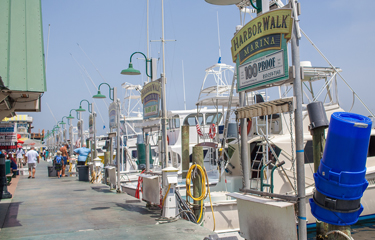Gulf of Mexico charter captains wade into red grouper court case

Commercial fishermen in the United States who are challenging a major shift of Gulf of Mexico red grouper quotas to the recreational sector have drawn the support of charter-boat operators, who argue the revised quotas hurt willtheir businesses as well.
On its face, the decision by the National Marine Fisheries Service to ratify the Gulf of Mexico Fishery Management Council’s new allocation policy would give the charter fleet more fish, too. But the change will bring other outcomes that hurt the charter sector, according to captain Scott Hickman, operator of Circle H Outfitters and Charters in Galveston, Texas, U.S.A., and a board member of the Charter Fishermen’s Association.
“We’ve been down this road before,” Hickman said. “You set a precedent for taking quota from an accountable sector and dropping it into a black hole.”
Announced by NMFS this spring, Amendment 53 to the Gulf reef fish plan would reduce the annual commercial allocation to 59.3 percent, down from 76 percent, and increase the recreational allocation from 24 percent to 40.7 percent.
The move is being challenged in federal district court by the Galveston, Texas, U.S.A.-based Gulf of Mexico Reef Fish Shareholders Alliance; the A.P. Bell Fish Company, of Cortez, Florida, U.S.A.; and the Southern Offshore Fishing Association, a longliner group based in Madeira Beach, Florida, U.S.A.
The case is tentatively scheduled for courtroom arguments in October 2022.
The Charter Fishermen’s Association joined in by filing an amicus, or “friend of the court” legal brief to express its opinion and advice on the case. The charter captains have done the same with an earlier move to shift more red snapper quota to the recreational sector, allying with commercial fishermen to challenge the Gulf council and NMFS.
Awarding more quota to the recreational side has led to overruns in landings, and subsequent cuts that ultimately hurt the for-hire recreational sector and associated shoreside businesses like restaurants that depend on anglers, according to Hickman.
“Over the last 15 years or so, we’ve found we’re better aligned with the commercial sector,” Hickman said.
Long-term population and demographic changes on the Gulf coast have helped boost the influence of recreational fishing advocacy groups like the Coastal Conservation Foundation and American Sportfishing Association, aided by marine and fishing equipment manufacturers.
Those changes have swung the pendulum on council membership.
“They’ve flipped control of our council,” Hickman said, noting that council seats that had been held by commercial representatives for 30 years are being whittled away.
“Where do you draw the line?” said Hickman. “If you’re wealthy enough to own a house on the coast, and a half-million dollar offshore boat, should you control all the resource?”
Critics of Amendment 53 say the NMFS and the Gulf of Mexico Fishery Management Council based the reallocation on a new methodology for calculating recreational landings. That methodology is already extending recalculation to other Gulf fisheries.
"Reallocation to the recreational sector under Amendment 53 increases dead discards and commercial fishermen are forced to fish under a reduced catch limit to cover those discards," the Reef Shareholders Alliance said in June. "So commercial fishermen are penalized twice: first by the reallocation and second by lower overall catch limits to offset increased recreational discards. In essence, commercial fishermen now have a smaller piece of a smaller pie as a result of Amendment 53."
The political influence of the recreational lobby inspired another player to jump into the Gulf of Mexico red grouper lawsuit: Louisiana Attorney General Jeff Landry.
In a motion in federal court, Landry seeks to join as an intervenor in the case brought by commercial fishermen. In a 23 August statement Landry characterized the lawsuit as “attempting to stifle recreational fishing in Louisiana.”
“I will continue fighting to ensure Louisiana remains ‘The Sportsman’s Paradise’ for all who live and visit here,” Landry said. “Recreational and commercial fishing have coexisted in Louisiana for ages; We cannot allow one to be preserved at the expense of the other.”
Landry should not be allowed to join the case as an intervenor, said Eric Brazer, deputy director of the Reef Shareholders Alliance.
“We opposed on the grounds that Louisiana does not have standing as defined by the law, but would not be opposed if they wanted to submit an amicus brief,” Brazer said.
Recreational fishing survey data show only a handful of red grouper are caught annually by Louisiana anglers, according to Gulf of Mexico Reef Fish Shareholders’ Alliance Policy Director Ashford Rosenberg.
“It’s a bit of a stretch to say this is going to hurt [sport fishing in Louisiana]," she said.
Reporting by Kirk Moore
Photo courtesy of Stephanie A Sellers/Shutterstock






Share